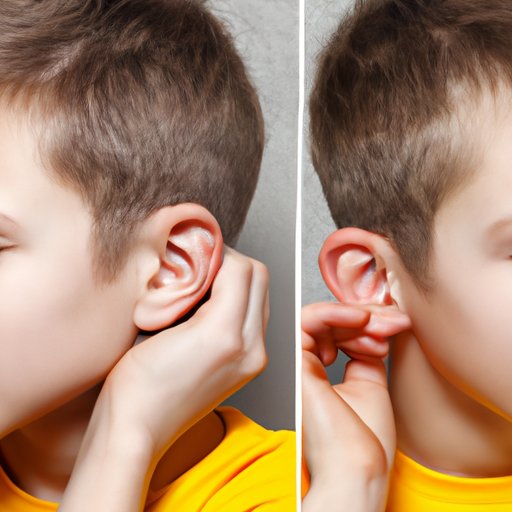
I. Introduction
Ear infections are a common occurrence for people of all ages, from infants to the elderly. They can be painful, uncomfortable, and even dangerous if left untreated. In this article, we will explore how to know if you have an ear infection, when to see a doctor, home remedies to ease the pain, causes, prevention, and more.
II. Symptoms of an Ear Infection
The most common symptoms of an ear infection include ear pain, drainage from the ear, and hearing loss. You may also experience fever, a feeling of fullness in the ear, and difficulty sleeping. It is essential to know when the symptoms are severe enough to warrant seeking medical attention. If you develop severe pain or have a high fever, or notice swelling behind the ear, you should consult with a doctor immediately.
III. When to See a Doctor for an Ear Infection
It is crucial to seek medical attention if your symptoms are severe, or if you experience other alarming signs. Untreated infections can result in complications like hearing loss, and in rare cases, can even spread to the brain. You should consult a doctor immediately if you experience dizziness, severe headache, confusion, or stiff neck. These are all signs of a severe infection.
IV. Home Remedies to Ease the Pain of an Ear Infection
While it is necessary to seek medical attention if your symptoms are severe, there are some home remedies that can alleviate the pain associated with ear infections. Warm compresses can provide relief from pain and swelling, and over-the-counter pain medications like acetaminophen or ibuprofen can also help. Ear drops can also be used to relieve pain and inhibit bacterial growth. Additionally, it is essential to get lots of rest and to stay hydrated to help your body fight the infection.
V. Causes of Ear Infections: What You Need to Know
Several factors can cause ear infections, with the most common cause being fluid buildup behind the eardrum. This can occur due to respiratory infections, allergies, or changes in air pressure like when flying on an airplane or diving. Foreign objects lodged in the ear canal can also cause an infection. It’s essential to keep your ears clean and dry to reduce the risk of infection.

VI. Ear Infections in Children: When to Be Concerned
Ear infections are particularly common in infants and young children, due to their immature immune systems, smaller Eustachian tubes, and increased exposure to germs. Parents should be aware of the symptoms of ear infections in infants and seek medical attention promptly if they see signs like fussiness, fever, or drainage from the ear. Chronic ear infections can lead to hearing loss, impaired speech development, and other complications, so early treatment is crucial.
VII. How to Prevent Ear Infections from Occurring Repeatedly
The best way to maintain ear health and prevent infections is to practice good hygiene, avoid irritants like tobacco smoke, and get vaccinated. Washing your hands frequently, particularly before eating or touching your face, can significantly reduce the risk of infection. Additionally, avoiding exposure to people who have colds or other upper respiratory infections can help. If you are prone to ear infections, your doctor may recommend earplugs or other protective measures when swimming or showering.
VIII. Conclusion
Ear infections can be painful and uncomfortable, but timely intervention and prevention can help alleviate the symptoms and reduce the risk of complications. If you experience symptoms like ear pain, hearing loss, or drainage from the ear, it’s essential to seek medical attention. Home remedies can help alleviate the pain, and preventative measures like good hygiene, vaccination, and ear protection can reduce the risk of recurrent infections.





